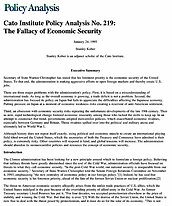Secretary of State Warren Christopher has stated that his foremost priority is the economic security of the United States. To that end, the administration is making aggressive efforts to open foreign markets and thereby create U.S. jobs.
There are three major problems with the administration’s policy. First, it is based on a misunderstanding of international trade. As long as the overall economy is growing, a trade deficit is not a problem. Second, the administration has focused its policy on Japan but fails to appreciate the difficulties affecting the Japanese economy. Putting pressure on Japan at a moment of economic weakness risks creating a reservoir of anti-American sentiment.
Third, an obsession with economic security risks repeating the unfortunate developments of the late 19th century. Then as now, rapid technological change fostered economic insecurity among those who lacked the skills to keep up. In an attempt to counteract that trend, governments adopted mercantilist policies, which exacerbated economic rivalries, especially between Germany and Britain. Those rivalries spilled over into the political and military arena and ultimately led to World War I.
Although history does not repeat itself exactly, using political and economic muscle to create an international playing field tilted toward the United States, which the secretaries of both the Treasury and Commerce have admitted is their policy, is extremely risky. Other countries will respond in kind, and global tensions will increase. The administration should abandon its neomercantilist policies and renounce the concept of economic security.

This work is licensed under a Creative Commons Attribution-NonCommercial-ShareAlike 4.0 International License.
